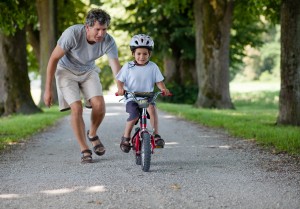Would you be able to learn how to ride a bicycle from being told? Or by practice alone? Being taught to ride isn’t the same as practicing riding, but the two supplement each other and are necessary to help the student eventually acquire the real sense and skills to actually maneuver the machine.
Verbally hearing someone explain how to ride a bicycle doesn’t immediately grant the student the ability to ride. Some things can’t be taught, such as the ability to find the center of balance, the feel of the resistance of the pedals, and the delicate and subtle skill of steering of the front wheel. Although they can be described, or taught, they can’t actually be known unless the student is able to really experience it.
In this example, teaching is the passing of knowledge from one mind to another, and practice or experience is the physical repetition of movements and the memories created from those moments. Although the transfer medium is similarly information, teaching requires another mind while experience requires one’s own body. The flaw of this example is that it makes teaching and experience look like two different things, but they’re not. Every time the rider regains their balance, every time they “get the hang of it,” the rider gains information on how to accomplish their task. In this sense, practice is a form of teaching too. Although teaching and experience are not the same things, there are more similarities between the two than there are differences.
In Meno, Meno, the young aristocrat from Thessaly, asks an important question: “Is being good something you can be taught?” (p. 86, 70a) He then lists the methods he knows of to become good: being taught, practice, and an innate goodness.
A person can become good by being told what good qualities are from a teacher. A person can also become good by practicing good qualities. Yet, at what point does the practice no longer constitute experience, but teaching? Or when does teaching not mean spreading knowledge, but practice? The answer is difficult to reach because they are inseparable terms. Both are required to gain knowledge.
The reality is that teaching and experience go hand in hand. When people think back to any time or event in their life, they often say in a reflective way that they have “learned so much.” When someone dies, they learn to love. When they get hurt, they learn to feel pain. And when they take a philosophy class, they learn to think critically about the dichotomy between the very topic of teaching and experience.


One response to “To Practice or to Preach?”